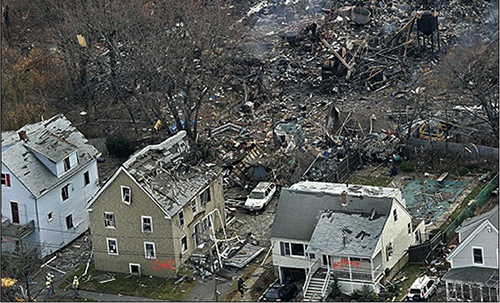Industrial Accidents Project

WPI Boston Project Center: Preventing Industrial Accidents in Severe Weather
Student Project Evaluates Chemical Safety and Climate Change Resiliency Plans

Explosion in Danvers, MA in 2006 that devastated an entire neighborhood
As a waterfront city, Boston is particularly vulnerable to impacts from climate change and severe weather. From astronomically high tides to storm surges or hurricane-force winds, unusual patterns create potentially dangerous situations for the many homes and businesses in the vicinity of industries that handle, store, or use hazardous chemicals. Industrial accidents from these changes can have catastrophic results.
But business and industry can take steps to mitigate and avoid the risk of industrial accidents that happen when areas with hazardous chemicals flood. A team of WPI students recently completed their Interactive Qualifying Project (IQP)—a project that requires teams to delve into problems that matter to real people—to find out what kinds of training programs are most effective for businesses that want to reduce the risk of chemical releases from industrial accidents.
Working with the project’s sponsor, the Office of Technical Assistance and Technology (OTA), the students’ work involved helping make training sessions more effective for industry and businesses around the Commonwealth. With the results, they made recommendations for how the OTA can help businesses understand their risk and reduce it.
The team of four—biomedical engineering major Matt Cannata, mechanical engineering and computer science major Przemyslaw Gardias, chemical engineering major Shaye Johnstone, and computer science major Daniel Sullivan—worked at WPI’s Boston Project Center in the Seaport district.
“The students helped us evaluate our training program to prevent industrial accidents,” says Tiffany Skogstrom, outreach and policy coordinator at the OTA.
- Tiffany Skogstrom, Project Sponsor

Students jumped in to contact businesses that had completed OTA trainings to find out what worked and what might be more engaging or effective. They talked with first responders, municipal workers, and businesses where toxic chemicals are used to determine what parts of the trainings were most helpful and if any of the OTA recommendations could be implemented, says Skogstrom.
Because few agencies in the country are even addressing the issues of chemical safety and climate change resiliency, Skogstrom says the collaboration is particularly timely. “Hopefully, our work is going to be a model for other communities in order to prevent accidents from happening,” she says.
The project preparation began long before the students got to Boston. They met with sponsors to identify the problem and figure out how to best approach and solve it. They looked at OTA information and studied area maps to understand which spots in and around Boston were most vulnerable and why.

The preparation turned out to be an important step in understanding the project’s scope. “During the preparatory stage when the students were getting ready for their project, I had the opportunity to talk with them by phone, to send emails back and forth,” says Skogstrom. “It really helped us develop what they would be working on when they were in the office and what type of projects they would deliver for this project. By the time they got here, we had enough communication back and forth and they could hit the ground running.”
Talking to OTA clients gave the students important pieces to the puzzle. “Most of our work has been interviewing and surveying clients of our sponsor in order to figure out what elements of our sponsor's training and services are beneficial to them versus more unnecessary and what could be added,” says Johnstone.
Students enjoyed having a peek into the future where they could understand the challenges of working with a diverse team, experiencing the real world environment of commuting, and remaining flexible while working in different places and with varying team structures. “Working on this project has allowed me to gain a better understanding of the strengths I can bring to the table in a group and to really see the possibilities I can have in this world in any type of project,” she says.
- Shaye Johnstone, Junior
As the project progressed, they learned how to take greater ownership of the whole project. “It's your project and you have to decide what your deliverables are,” says Cannata. “You have to decide what your schedule is for the day. You have to decide what tasks you're actually completing for the day. It's not laid out in front of you.”
“I think the students came at the perfect time,” says Skogstrom. “I needed to really evaluate how things were going and how we might be able to move forward with our program, using some feedback from the participants.”
She says they looked at the program with a fresh approach, making valuable suggestions for technology use and results that will create an impact. “The trail is now hot for us to follow up,” she says. “Now the businesses have heard of OTA because the students reached out to them. Our outreach is better and staff can follow up and focus in on how we can help.”

Conducting a sponsor meeting at the Office of Technical Assistance and Technology
The students’ research revealed some surprises. As the team contacted participants, they could report the clients’ direct requests for more webinars or better information delivery. And they also heard what the OTA is right on target with. “People really liked our online interactive map that shows the vulnerabilities to climate change and severe weather and toxics users locations,” says Skogstrom. “We found that we need to make more of those tools available to the people we service.”
The main focus of the work is how businesses can prevent chemical accidents in times of severe weather or climate change, but the impact affects the entire region. “It's the surrounding communities that are near these businesses that will get the benefit of a safer environment, improved public health, less risk to accidents,” she says. “When we all work together, we can help prevent these accidents from happening.”
- Tiffany Skogstrom, Project Sponsor
Skogstrom notes the students’ positive attitude and new approach to problem solving added to the project’s impact and value. “I appreciated everything they did,” she says. “The students' work was something that is going to really help make our programs more powerful and more effective.”